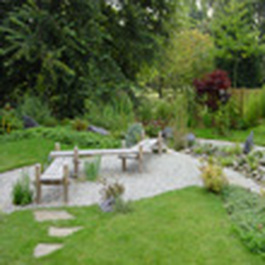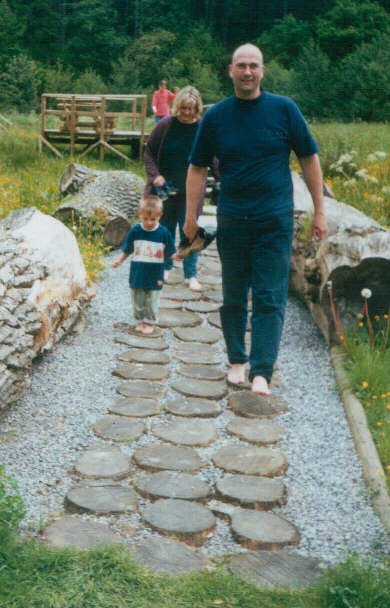- Stroke victims – through discovering how to use surfaces, scents and tastes to stimulate walking and memory responses
- Spinal injured and nerve damaged patients – through discovering accessible, therapeutic horticulture
- Teachers and carers of children with ADHD, Angelman Syndrome, ASD, Autism, Barth Syndrome, Brain Tumour, Cerebral Palsy, Chromosome Disorder, Cornelia De-Lange Syndrome, CP, Developmental Dysplaysia, Diastrophic Dysplaysia, Downs Syndrome, Encephalitis, Epilepsy, Fragile X Syndrome, Global Development Delay, Heart Condition, Hemiplegia, Hypermobility, Hypotonic, Lissencephally, Low Muscle Tone, Microcephaly, Muscular Dystrophy, Ohtahara Syndrome, Pneumocoocal Meningitis, Pulmonary Stenosis, Rett Syndrome, Scoliosis, Sotos Syndrome, Spastic Diplegia, Spina Bifida, Tetrasomy, Tuberous Sclerosis. - creation of calm space for those in ‘sensory overload’, balanced with stimulating environment to boost confidence and self expression
- Occupational therapists, or persons in the caring professions and charities concerned with this client group
- Teachers and carers of global development delay children – through learning how to provide a stimulating environment to elicit a response
- Social housing owners and developers – cost effective gardens for ‘at risk’ residents, creating sense of community, safe natural play places to reconnect children with nature
- Urban designers – architects, urban planners, landscape architects – how to create urban environments to meet changing needs of community (aging, disabled, immigrant)
- Play providers – local authorities, national trust, forestry commission, head teachers association – those requiring guidance on how to design and provide spaces where a child can withdraw easily and safely, so that they can learn to regulate his or her own sensory input, and welcoming spaces where intergenerational groups can relax and engage and enjoy their time together.
- Home
- Why Greenstone
-
Services
-
Gallery
- Dementia sensory gardens
- International School grounds design - AAS Moscow
- Natural play in Early Years - North Islington
- Sensory play gardens - Hickory House
- Special needs schools - sensory play
- Sensory gardens for mental health - residential care village Norwood
- Stressed execs - residential sensory gardens
- Outdoor classrooms and community gardens
- Eco resorts - Portugal, Malaysia
- News
- Links
- Publications I Press
|
When my editor asked me to think of all the potential users of a book on sensory gardens I came up with the following list:
1 Comment
 Sensory Gardens stimulate different movement modalities We are asked to design sensory gardens for children and adults all around the world. But what is a sensory garden? Over the past 20 years interest in sensory gardens has grown. Early 'sensory gardens' were simple gardens for the blind, with aromatic planting and textured leaves about the only feature of the gardens. They evolved into Wellness Gardens in the late 1990's. Today a sensory garden is a soft landscape designed to stimulate the senses. Specially designed gardens for disabled children can be deeply therapeutic spaces. Sensory gardens are acknowledged as benefitting non disabled children as offering a calming space to recoonect with nature. Sight, sound and touch are easily designed for within such a space. Our sensory gardens generally offer taste sensations through edible planting. We are careful to ensure that anything that can be put into the mouth is non toxic. This is not only good for the people using the garden, but also good for the environment |
AuthorGayle Souter-Brown founded Greenstone Design in UK in 2006, serving Europe, Africa, Asia, South and North America. Since 2012 the expanding team is delighted to offer the same salutogenic landscape architecture + design practice also from NZ, giving a truly global reach. Archives
June 2018
Categories
All
|
|
Services
> edible gardens > planting plans > resorts > community gardens > gardens for health > urban design > air quality > natural play > inclusive play > sustainable playgrounds > outdoor learning > special needs > school grounds design > inset day & CPD training > social & therapeutic > sensory gardens > wellness gardens |
Greenstone Design UK Ltd is registered in England & Wales No.06944998. Registered Office: Alderbrook, Abinger Hammer, Surrey RH5 6SA UK. VAT registration No 976 3017 05 |
Corporate Social Responsibility | Diversity & Equality | Environmental Policy
Quality Management Statement
© Greenstone Design UK Limited 2001-2020 All rights Reserved
Based on the Surrey-Hampshire border we work locally, nationally and internationally to advise and design gardens for health and well-being


 RSS Feed
RSS Feed